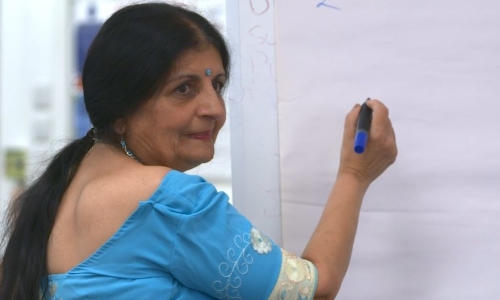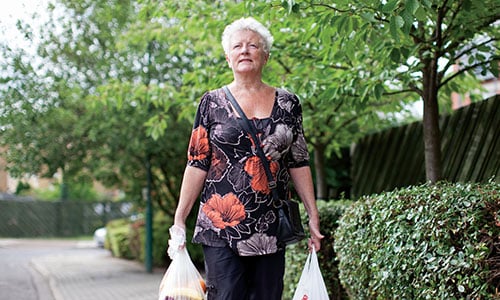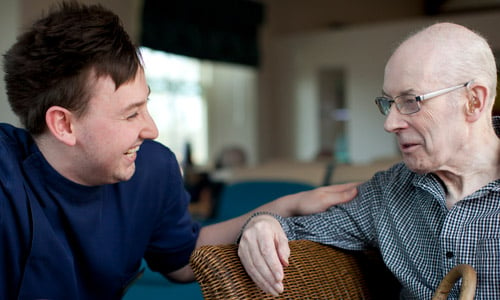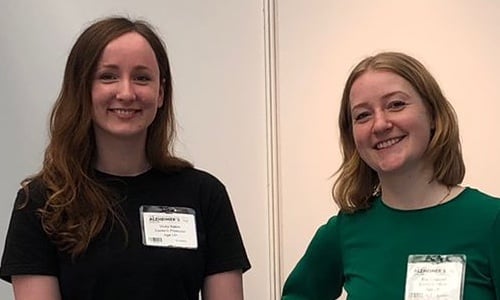In a green expanse of allotments not far from the banks of the river Exe, the Budding Friends gardening group is keeping busy.
“The weather made it so hard to get out on our allotment for the first half of the year,” says Penny, Dementia Lead at Age UK Exeter, and the powerhouse behind Budding Friends. “But now we’ve been able to put the time in, it looks fabulous. We’re growing a lot of fruit and vegetables – like courgettes, sweetcorn, tomatoes and raspberries. We’ve planted plenty of flowers too. Their colours bring a lot of joy.”
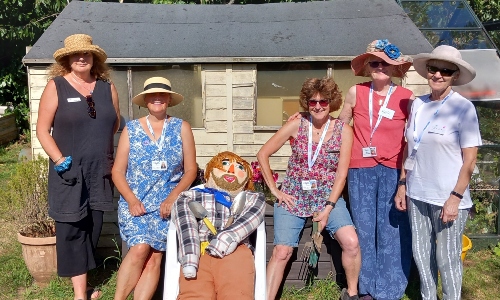
Bringing joy is at the root of Budding Friends, which started life as a pilot project run by Age UK Exeter nine years ago. Since then, for two hours every Monday afternoon, the group has welcomed older people living with dementia and the carers who look after them to an allotment bursting with activity.
“We wanted to prove that being outdoors is very good for you, whatever your situation,” Penny tells us. “But it made such a big difference to our attendees that we now offer it as one of our core services.
“At the start of every session, we have a chat around the table to see what people would like to do that day and if they’re feeling up to it. Some might help with digging and harvesting, others might just want to bunch together some broad beans or sit and listen to the bird song. Whatever we do, everyone is involved.”
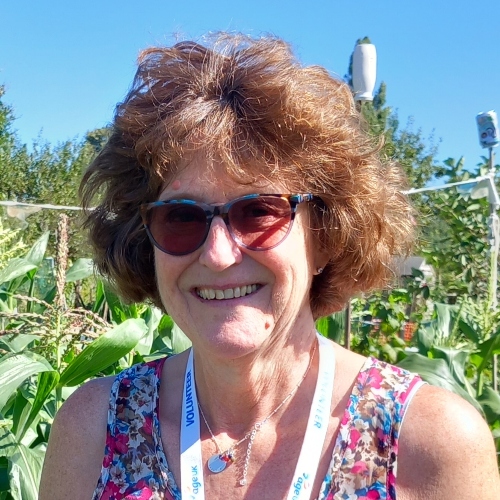
[Budding Friends] was a lifesaver for me... it's very special. So when my husband died in 2017, I decided to carry on helping.
Long-term belonging
This sense of involvement stretches to the group’s volunteers, many of whom originally joined Budding Friends as carers with their loved ones.

Today, Mike is fixing the greenhouse window, and he often comes to the allotment to mow the grass or help with planting. But his experience of Budding Friends began with his wife, as a way for her to socialise while living with dementia.
“It was just the two of us sat at home, so we started coming here,” Mike explains. “My wife wasn’t really into gardening, but she enjoyed sitting under the gazebo chatting to everyone. More than anything, it was nice to be able to do something together. She lives in a home now, but I still come back to help.”
Fellow volunteers Lindsey and Maria feel a similar pull towards the group, having both first joined with their late husbands. “My husband and I started coming to Budding Friends back in 2015, when the group first came about,” says Lindsey. “It was a lifesaver for me, and my husband enjoyed it too. It’s very special. So when my husband died in 2017, I decided to carry on helping.”
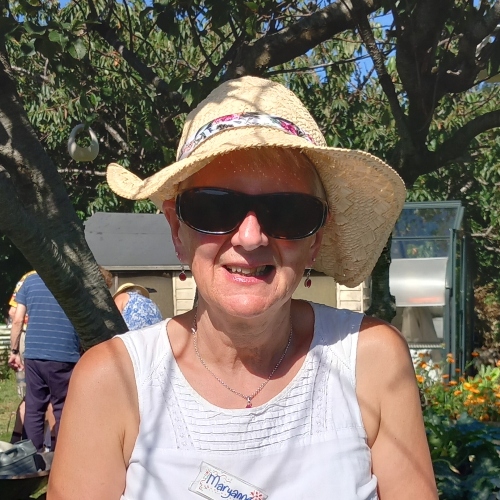
The other carers are very supportive – we finish each other’s sentences!
Maria remembers the effect Budding Friends had on her late husband, John. “At the end of every visit, John was smiling, he was happy,” she says. “Sometimes he’d ask me, ‘when are we going to see those lovely people?’ and we’d have just got back! I’d see his whole demeanour lift by the end of every session. Everyone is very tactile and supportive here, and he absorbed that feeling of warmth and belonging. John was rapidly deteriorating week by week, but he felt that he was part of something.
“After John died in September last year, I just kept coming along. What’s lovely is that everyone in the group knew John and loved him a lot, so I can share stories about our life together and we can talk about him. The group has become my grieving support, I suppose. My volunteering is a two-way process – it doesn’t feel like a chore in any way. I still look forward to it every week.”
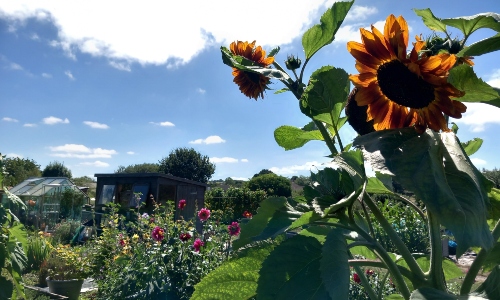
Someone who understands
For attendees who are currently caring for loved ones living with dementia, having the support of volunteers who have experienced similar situations is especially valuable.
“Because we’ve lived it, we really understand what everyone is going through,” Lindsey explains. “So they often don’t have to say anything – they just know that we know, and that makes it easier somehow.
“Penny also often tries to arrange it so that some of the carers can go off to work in a different part of the allotment, and the people they’re caring for can stay with the volunteers. It gives the carers some time to talk to each other and share their experiences, which is so important.”
The first time I came here I burst into tears with the sheer relief of meeting other people going through the same thing.
Today, it’s the allotment’s polytunnel which has demanded the attention of Maryanne and Teresa, who are both supporting their husbands through living with dementia. In between picking cucumbers, the pair can discuss the ups and downs of their week, while their husbands Alan and Peter work with volunteers elsewhere.
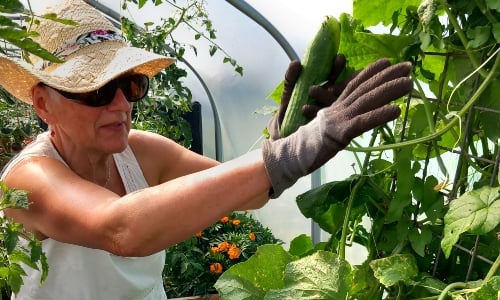
“The first time I came here I burst into tears with the sheer relief of meeting other people going through the same thing,” says Teresa, who has been attending the group with her husband Peter since 2021. “People are often very frightened of dementia and don’t know what to say, but being with people in the same situation makes you feel less isolated and marginalised.”
Maryanne agrees: “The other carers are very supportive – we finish each other’s sentences!
“Prior to my husband Alan’s diagnosis we were both working, but his rapid decline meant that I had to give up my job as he wasn’t safe to be left. So his diagnosis has been life-changing for both of us, and very traumatic. But at the same time it’s been wonderful, because we’ve met so many new people and learned so many new things.
“Neither of us was interested in gardening before. But Alan gets very agitated at home, and I’ve found that here he can focus on digging without worrying about anything else. We also water all the plants twice a week, and on Saturdays we sometimes visit the allotment and bring a picnic. We get so much pleasure out of it.”
When I talk to other people who have come here with their partners, have since lost their partners, and are finding ways to carry on, that gives me strength.
The connections sown in Budding Friends have grown into a wider community, too. “I’ve made some really lovely friends here and we’ve met up outside of the group as well – like going to dementia-friendly theatre performances together,” says Teresa. “Everyone’s also really good at telling you about additional resources that have helped them. It’s because of those chats that I sorted out my Attendance Allowance.”
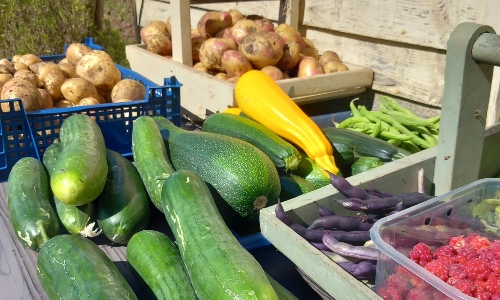
As well as helping to improve her present situation, Teresa is clear that Budding Friends has helped change her approach to the future. “When you first get that catastrophic diagnosis, your life shrinks and you feel like everything is over. But when I talk to other people who have come here with their partners, have since lost their partners, and are finding ways to carry on, that gives me strength. If you’d have told me five years ago that I’d be here dealing with all of this, I wouldn’t have thought I could stand it. But here I am.
“Budding Friends punches so far above what it is. It’s two hours on a Monday afternoon, but it grounds you – and you go ahead feeling like you can manage whatever the week will bring.”
Search for support services in your area
Local Age UKs run carer's support and dementia support services across the country.



